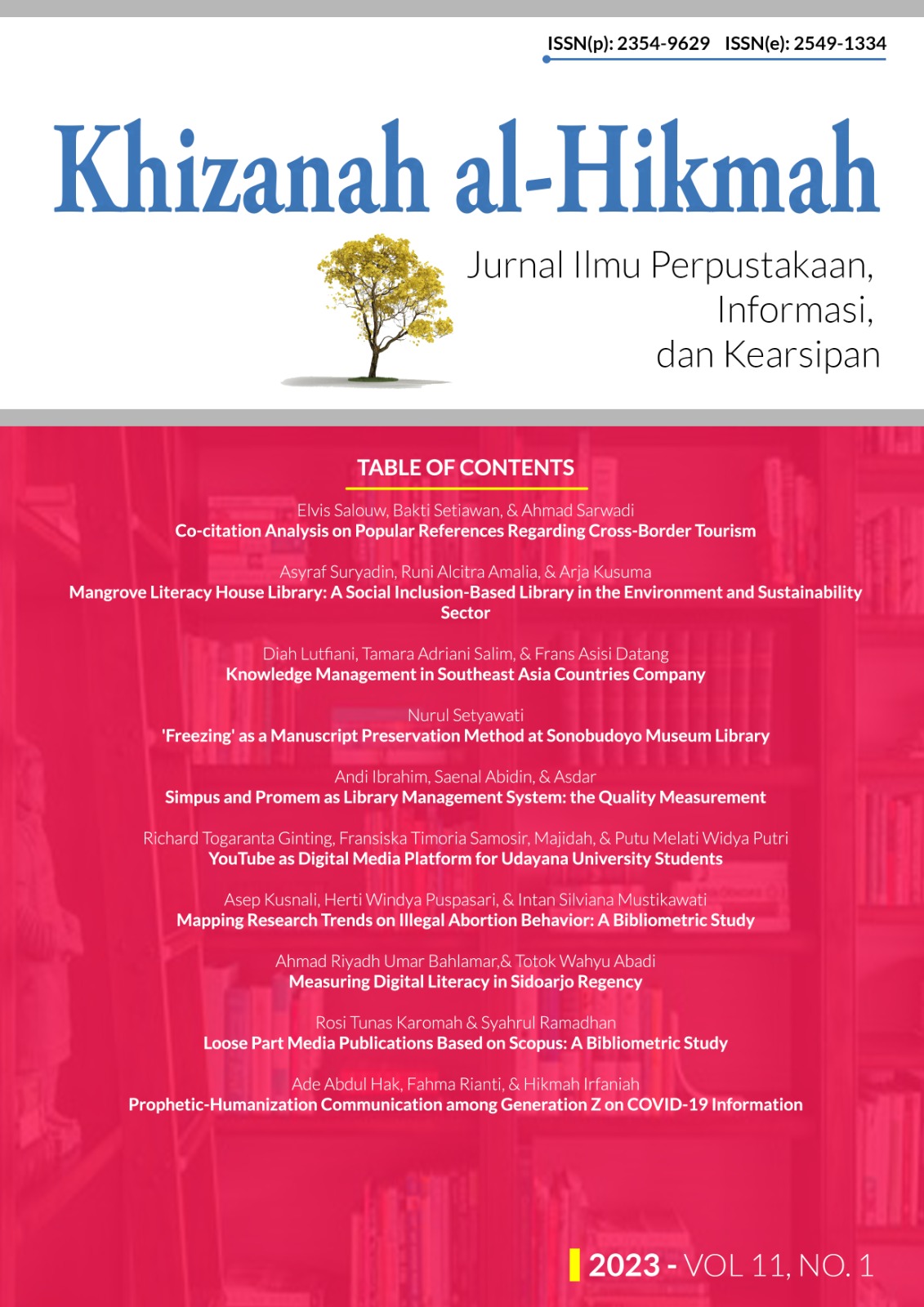Bridging the Gap Between Education and Experience: A Comparative Analysis of IPB University Museum's Visitor Experience
Abstract
The IPB Museum, located on the Darmaga Campus of IPB University, serves as a platform to showcase its rich history, developments, and future aspirations. University museums are vital institutions, embracing innovation and fostering communities of knowledge. Previous research emphasizes the impact of visitor experience on satisfaction and loyalty, highlighting the advantages of interactive technologies in museums for improved engagement and education. Evaluating technology's impact is crucial, and this study utilizes The Museum Tourism Experience and Experiential Value questionnaire to provide a baseline measurement and benchmark for future interventions, enabling a comprehensive evaluation of technology's impact on visitor experiences and satisfaction. In this study, 103 undergraduate students from the User Experience Design Course were invited to visit the IPB Museum to assess their experience using The Museum Tourism Experience and Experiential Value (MTEEV) questionnaire, which evaluates five aspects of the visitor experience. The students completed the questionnaire both before and after their visit, aiming to measure the impact of the museum visit on their perception and evaluate the effectiveness of the IPB Museum. The museum received lower ratings in visual appeal, entertainment, escapism, willingness to pay more, and imaginary vividness compared to visitors' past experiences, indicating potential areas for improvement to enhance the overall visitor experience. Lastly, we present our participatory strategy using MBKM and the capstone program to improve the museum experience.
Downloads
References
Asfarian, A., Ramadhan, D. A., & Ardiansyah, F. (2020). Integrating Humanitarian Technology in Computer Science Education to Internalize Independent Campus Policy: A Case in IPB University. In 2020 IEEE 8th R10 Humanitarian Technology Conference (R10-HTC) (pp. 1-6). IEEE.
Asfarian, A., Wulandari, W. (2023). Digital Twin Platform Architecture Design to Support Smart Aeroponic Potato Cultivation in Indonesia. In Proceedings of the Business Innovation and Engineering Conference (BIEC 2022). Atlantis Press.
Bideci, M., & Albayrak, T. (2018). An investigation of the domestic and foreign tourists’ museum visit experiences. International Journal of Culture, Tourism and Hospitality Research. 12(3).
Cheng, K. H., & Tsai, C. C. (2019). A case study of immersive virtual field trips in an elementary classroom: Students’ learning experience and teacher-student interaction behaviors. Computers & Education, 140, 103600.
Damala, A., Ruthven, I., & Hornecker, E. (2019). The MUSETECH model: A comprehensive evaluation framework for museum technology. Journal on Computing and Cultural Heritage (JOCCH), 12(1), 1-22.
Devine, C., & Tarr, M. (2019). The digital layer in the museum experience. Museums and Digital Culture: New Perspectives and Research, 295-307.
Ferri, P., Guagnini, A., Elena Santagati, M., & Zan, L. (2021). Managing Bologna university museums and collections (1970–2015). Museum Management and Curatorship, 36(5), 523-547.
Gong, Z., Wang, R., & Xia, G. (2022). Augmented reality (AR) as a tool for engaging museum experience: a case study on Chinese art pieces. Digital, 2(1), 33-45.
Harrington, M. C., Tatzgern, M., Langer, T., & Wenzel, J. W. (2019). Augmented reality brings the real world into natural history dioramas with data visualizations and bioacoustics at the Carnegie Museum of Natural History. Curator: The Museum Journal, 62(2), 177-193.
He, Z., Wu, L., & Li, X. R. (2018). When art meets tech: The role of augmented reality in enhancing museum experiences and purchase intentions. Tourism Management, 68, 127-139.
Karomi, A. M., & Ridha, A. (2022). Augmented Reality untuk Museum Serangga IPB Menggunakan Unity dengan Image Tracking. Jurnal Ilmu Komputer dan Agri-Informatika, 9(2).
Makransky, G., & Mayer, R. E. (2022). Benefits of taking a virtual field trip in immersive virtual reality: Evidence for the immersion principle in multimedia learning. Educational Psychology Review, 34(3), 1771-1798.
Othman, M. K., Petrie, H., & Power, C. (2011). Engaging visitors in museums with technology: scales for the measurement of visitor and multimedia guide experience. In Human-Computer Interaction–INTERACT 2011: 13th IFIP TC 13 International Conference, Lisbon, Portugal, September 5-9, 2011, Proceedings, Part IV 13 (pp. 92-99). Springer Berlin Heidelberg.
Pattakos, A., Zidianakis, E., Sifakis, M., Roulios, M., Partarakis, N., & Stephanidis, C. (2023). Digital Interaction with Physical Museum Artifacts. Technologies, 11(3), 65.
Shehade, M., & Stylianou-Lambert, T. (2020). Virtual reality in museums: Exploring the experiences of museum professionals. Applied sciences, 10(11), 4031.
Stanbury, P. (2000). University museums and collections. Museum International, 52(2), 4-9.
Trunfio, M., & Campana, S. (2020). A visitors’ experience model for mixed reality in the museum. Current Issues in Tourism, 23(9), 1053-1058.
Were, G. (2010). Re-engaging the university museum: Knowledge, collections, and communities at University College London. Museum Management and Curatorship, 25(3), 291-304.
Copyright (c) 2023 Dean Apriana Ramadhan, Syafitri Hidayati, Auzi Asfarian, Firman Ardiansyah

This work is licensed under a Creative Commons Attribution-NonCommercial-ShareAlike 4.0 International License.
By submitting your manuscript to our journal, you are following Copyright and License

